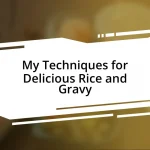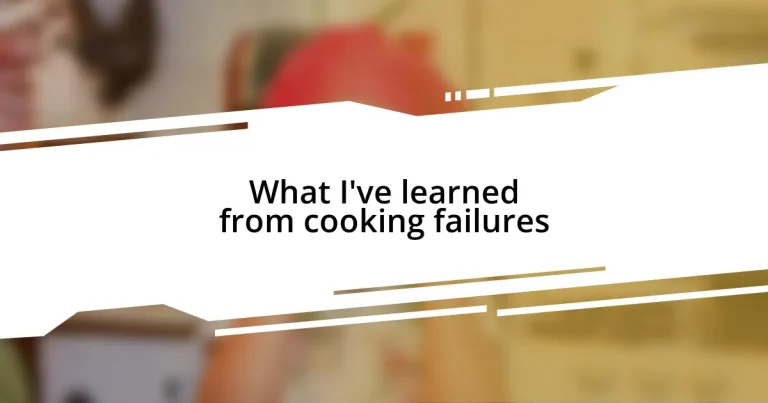Key takeaways:
- Cooking failures are learning opportunities that foster patience, technique, and a deeper appreciation for the cooking process.
- Common mistakes include rushing, improper ingredient preparation, and neglecting to taste dishes along the way.
- Embracing experimentation can lead to delightful surprises and valuable insights into ingredient roles and cooking methods.
- Celebrating small victories and sharing experiences with others enhances confidence and creates a supportive cooking community.
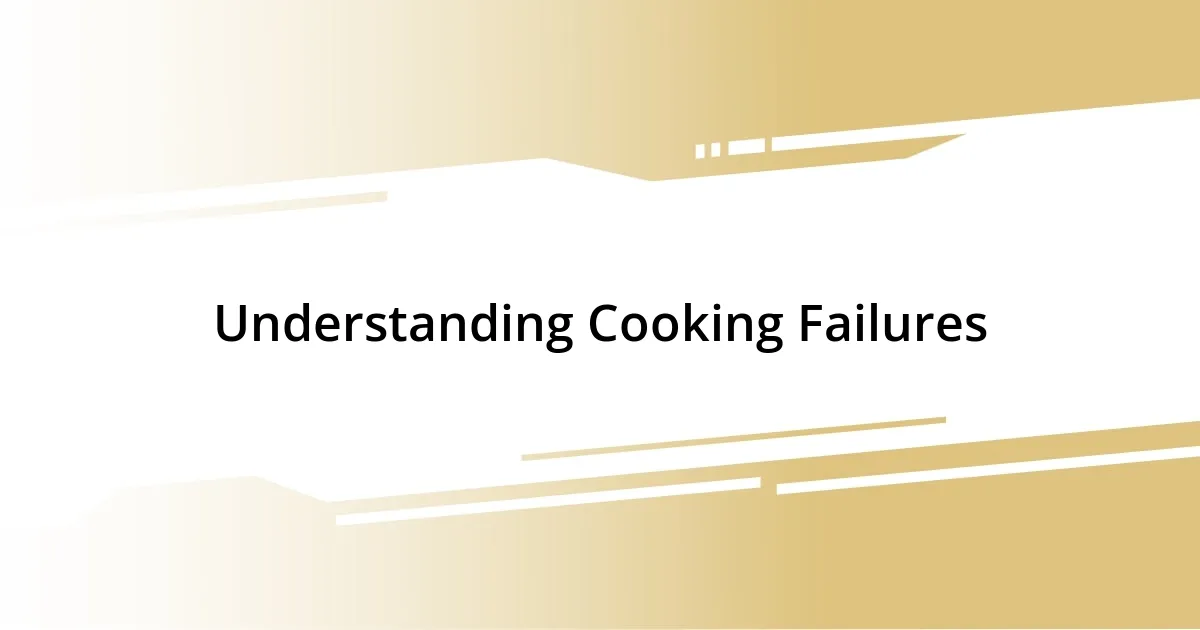
Understanding Cooking Failures
Cooking failures can feel disheartening, but they are invaluable teachers. I remember one Saturday where I attempted to bake a soufflé for the first time. Picture me in the kitchen, whisking egg whites with unwavering determination, only to witness my creation flop disappointingly in the oven. Had I not made that mistake, I might not have learned the importance of technique and precision—key components in many recipes.
When I reflect on those kitchen mishaps, I realize they often stem from rushing or overconfidence. There’s something humbling about pouring your heart into a dish, only to have it come out unrecognizable. I ask myself, “Was it really the recipe, or was it my approach?” Through these moments, I’ve cultivated a deeper understanding of patience and the need for careful planning in cooking.
Ultimately, cooking failures help us appreciate the journey. Each time I burned a sauce or miscalculated baking time, I felt a mix of frustration and introspection. It’s in those moments of despair that I truly learned to adjust, adapt, and ultimately grow as a cook. Isn’t it fascinating how a simple mistake can lead to such profound insights?
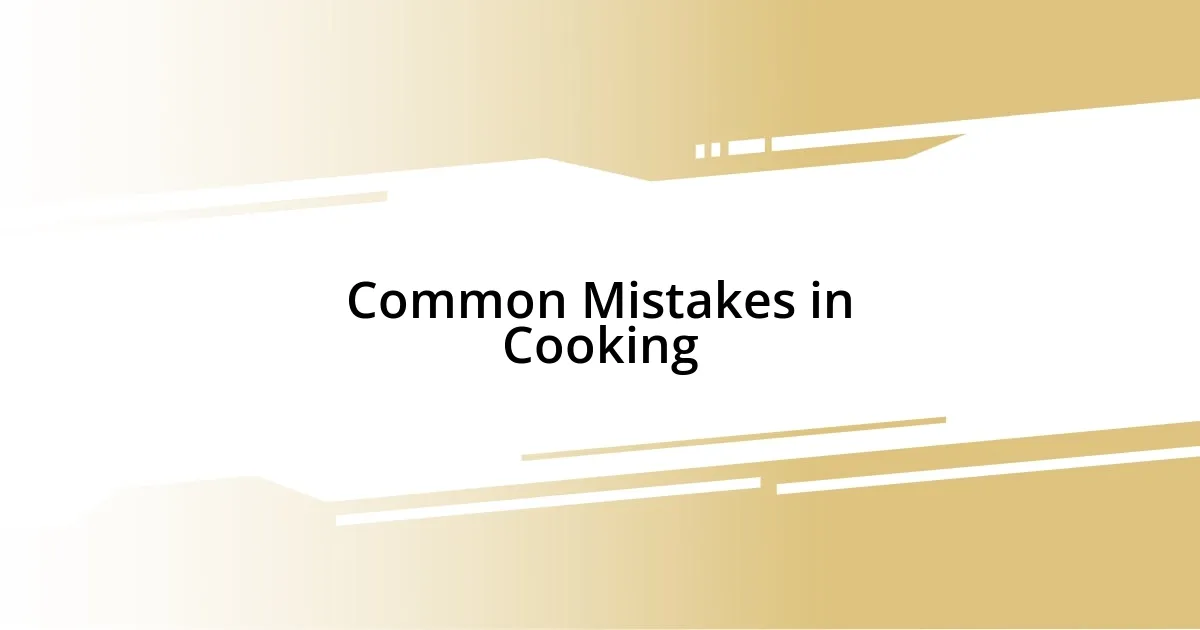
Common Mistakes in Cooking
One of the most common mistakes I see in the kitchen is not properly reading the recipe before starting. I remember once I got so eager to make a lasagna that I skipped over crucial details about ingredient preparation—like chopping vegetables or preheating the oven. The result? A sad, cold mess that even my dog side-eyed. Taking the time to fully understand what you’re about to embark upon can save you from that culinary disappointment.
Here are some other frequent cooking missteps:
- Ignoring Temptation: Often, we’re too impatient to wait for butter to soften or meat to reach room temperature. This can lead to uneven cooking.
- Overcrowding the Pan: When I packed too much into a skillet, I ended up with soggy veggies instead of the crispy, flavorful ones I envisioned.
- Not Tasting Along the Way: Leaving the final seasoning to chance means missing out on adjusting flavors to perfection. I’ve learned this the hard way, ending up with bland sauce more often than I’d like to admit.
- Using Dull Knives: I didn’t realize that a dull knife can lead to accidents and uneven cuts. An early experience left me with more than just a cut on my finger; it was a wake-up call to sharpen my tools and skills.
- Skimping on Cleanup: Sometimes I’d shove things aside to get cooking faster, but not cleaning as I go made the whole experience feel chaotic, impacting my ability to focus!
Reflecting on these errors invites a wave of familiarity, reminding us that cooking is an ongoing learning process where each mistake carries a lesson, ready to be embraced.
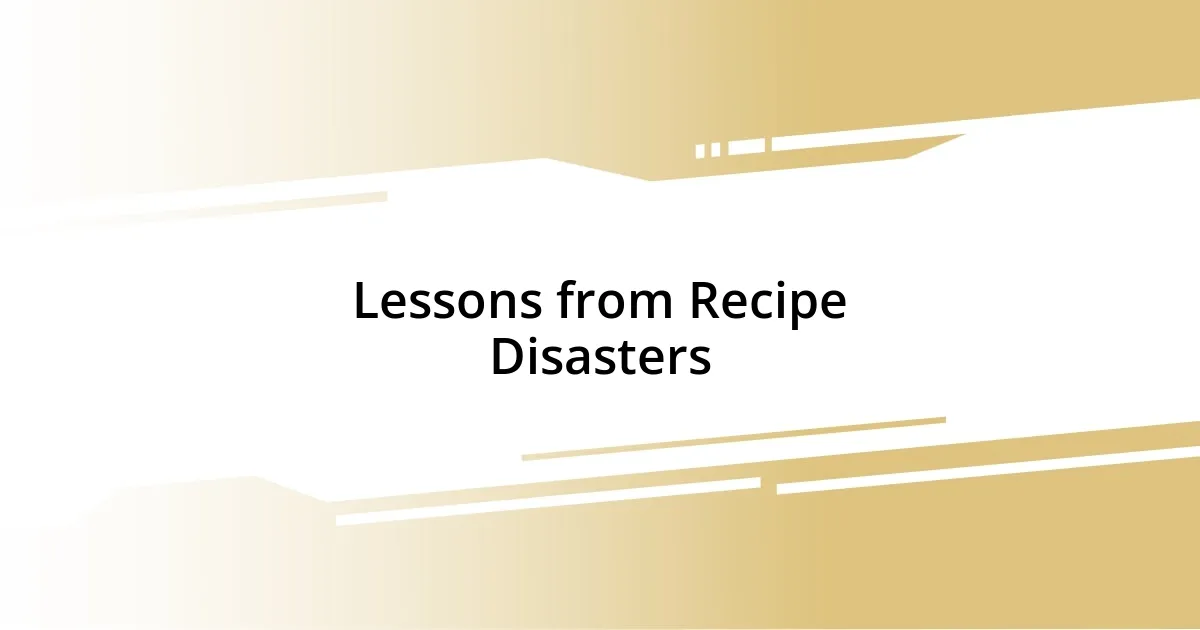
Lessons from Recipe Disasters
When it comes to recipe disasters, I’ve learned that experimentation can lead to unexpected delights—or complete chaos. I once whipped up a batch of cookies, convinced I could substitute baking soda for baking powder without a second thought. They came out looking like flat pancakes, and I couldn’t help but laugh at the absurdity of it all. This taught me the significance of understanding ingredients; each one plays a vital role in the outcome, and they shouldn’t be replaced without fully grasping how that change will play out.
I’ve also found that sometimes, failures reveal hidden gems. One evening, I misread a recipe for a creamy risotto. Instead of using broth, I mistakenly poured in heavy cream too early. The end result was a buttery, rich concoction that was certainly not what I’d intended, but was incredibly delicious! This experience opened my eyes to the idea that kitchen mistakes can be turned into serendipitous creations—sometimes the best dishes emerge from mishaps.
Lastly, let’s not overlook the emotional aspect of these kitchen trials. I recall a dinner party where my main course turned into a disaster. The roast was overcooked, and I could feel the weight of disappointment hanging in the air. I admitted my failure, and we all ended up laughing and ordering pizza instead. That experience reminded me that cooking is not just about perfection; it’s about connection and sharing moments together, even when things don’t go as planned.
| Lesson | Anecdote |
|---|---|
| Experimentation is Key | Substituted baking soda for powder and made flat cookies. |
| Embrace Serendipity | Heavy cream mishap turned into a richly delicious risotto. |
| Enjoy the Process | Overcooked roast led to laughter and pizza with friends. |

How to Analyze Failures
Analyzing cooking failures is a vital part of becoming a better cook. I recall a time when my soufflé collapsed because I rushed the folding process, overlooking the need for gentle hands. Reflecting on that moment helped me realize how important patience and technique are; it’s not just about following a recipe, but understanding the science behind it.
One effective approach I use is taking notes after such mishaps. I jot down what went wrong, why I think it happened, and how I could prevent it in the future. For instance, after a disastrous attempt at baking bread where I didn’t allow enough rise time, I wrote, “Patience equals perfect texture.” This practice not only helps me avoid repeating mistakes but also builds a sense of accountability in my cooking journey.
Have you ever thought about how emotions play into failures in the kitchen? I know I have. The frustration I felt when my cake sank in the middle helped me appreciate the joy of successful bakes even more. Analyzing these emotional responses can reveal patterns—like whether I’m likely to rush when I’m stressed. This self-awareness transforms failures into valuable lessons, enhancing both my cooking skills and my enjoyment of the process.
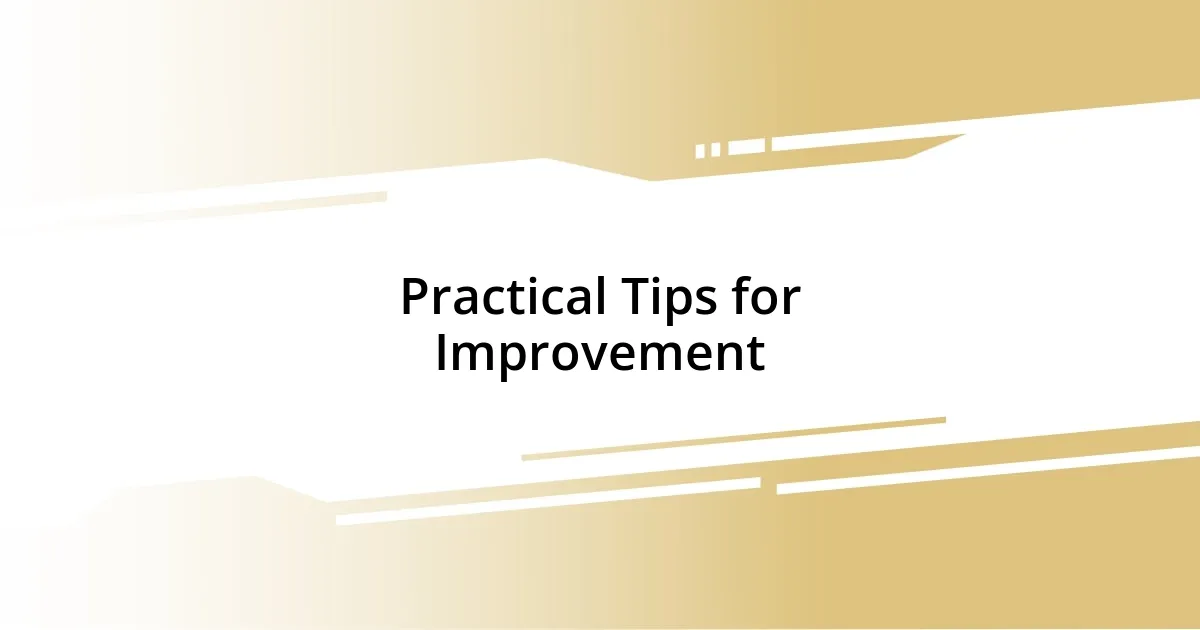
Practical Tips for Improvement
When it comes to improving my cooking, one practical tip I swear by is the importance of mise en place—everything in its place. I remember my first attempt at making a complex lasagna; I was overwhelmed by a mountain of ingredients. Having everything prepped and organized beforehand would have saved me from the chaos in the middle of cooking. Have you ever felt that stress of scrambling to find missing ingredients? It’s best avoided!
Another strategy I’ve embraced is to cook with a friend or family member. I once tackled a challenging paella with a fellow foodie, and the shared laughter over our minor mishaps turned cooking into a delightful experience, rather than a stressful chore. Not only did we double-check each step together, but we also turned our mistakes into shared memories and triumphs. Don’t you find it more rewarding to celebrate culinary victories with someone by your side?
Lastly, I always remind myself that practice is vital for growth; it’s essential to make time for it. After failing to properly caramelize onions on my first several attempts, I decided to spend an evening just practicing that single technique. I felt that sweet satisfaction when I finally nailed it—they were the perfect golden brown! There’s a certain joy in mastering a technique that once seemed beyond my reach, don’t you agree? It’s incredible how much confidence builds with every successful attempt, turning previous failures into stepping stones toward culinary mastery.
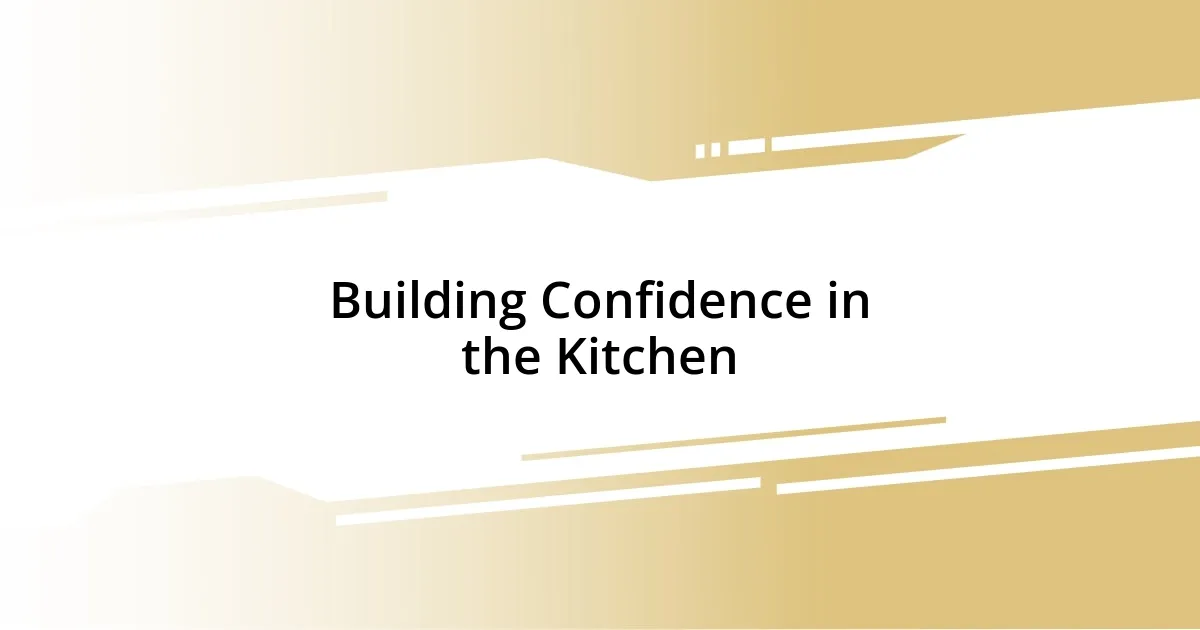
Building Confidence in the Kitchen
Building confidence in the kitchen is all about embracing the process, failures included. I remember a time when I misread a recipe and added salt instead of sugar to cookies. It was a disaster, but what struck me was how empowered I felt when I faced my mistake head-on. I learned that acknowledging failures rather than fearing them actually helped me grow as a cook.
Every time I step into the kitchen, I try to remind myself that cooking is an adventure. I recall the first time I attempted to make homemade pasta. The dough was a sticky mess, and I questioned whether I’d ever get it right. But with each attempt, I could see my skills improve, bringing me closer to the tender, delicious sheets I craved. Have you ever had that moment when you finally get a recipe just right? It’s a reminder that confidence is built through repetition and resilience.
I’ve found that sharing these experiences with others makes a significant difference. The last time I hosted a dinner party, I shared my mishaps from the week prior with my guests—like the gummy risotto that taught me the importance of slow stirring. Their laughter and encouraging words made it clear that cooking is more than just the end result; it’s about connection and the stories we tell. So, how can we shift our perspective on failures in the kitchen? By transforming them into shared experiences, we cultivate an environment where confidence flourishes and creativity thrives.

Celebrating Progress and Success
Celebrating progress in the kitchen isn’t just about the wins; it’s about recognizing the small victories along the way. I recall one particularly challenging evening when I spent hours attempting a homemade soufflé. When I finally pulled it out of the oven, even though it didn’t rise perfectly, I was overjoyed that I had managed to create something that resembled one! Instead of fixating on the imperfections, I focused on the flavors and the fact that I had conquered a difficult technique. Isn’t it remarkable how every little step forward can feel monumental in the cooking journey?
Success doesn’t have to be a grand affair; sometimes, it’s the little moments that matter most. For instance, after numerous attempts at frying chicken, I finally got the crispy coating just right. I can still vividly remember the satisfied grin on my face as I took that first bite—it was a celebration of persistence. It made me reflect on how important it is to honor such milestones, no matter how small. Have you ever experienced that feeling when you nail a recipe you once found intimidating? Celebrating those achievements, no matter their size, becomes part of the culinary adventure.
As I look back on my progress, I find that sharing my journey with others amplifies the joy of success. Recently, I invited friends over for dinner and proudly showcased my new skills in baking a cake from scratch. When they complimented my effort, it felt as though our laughter and shared enthusiasm transformed the kitchen into a true celebration. Doesn’t it feel great to have your progress validated by those you care about? Sharing these successes not only solidifies my own sense of achievement but also fosters a community around the love of cooking. It’s the perfect reminder that every step, including the missteps, leads us to celebrate our culinary growth together.








